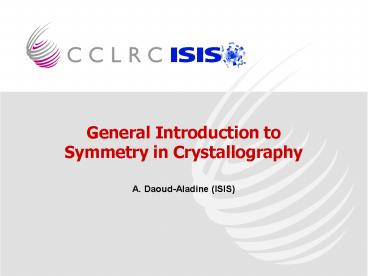General Introduction to Symmetry in Crystallography - PowerPoint PPT Presentation
Title:
General Introduction to Symmetry in Crystallography
Description:
Outline Crystal symmetry Representation analysis using space groups Translational symmetry Example of typical space group symmetry ... ( h point group ... – PowerPoint PPT presentation
Number of Views:164
Avg rating:3.0/5.0
Title: General Introduction to Symmetry in Crystallography
1
General Introduction to Symmetry in
Crystallography
A. Daoud-Aladine (ISIS)
2
Outline
Crystal symmetry
- Translational symmetry
- Example of typical space group symmetry
operations - Notations of symmetry elements
(geometrical transformations)
Representation analysis using space groups
- Reducible (physical) representation of space
groups - Irreducible representations of space groups
(group properties)
3
Crystal symmetry Translational symmetry
4
Crystal symmetry Space group operations
definition
2
1
g
1
O
h m ( h point group operation)
1
2
1
Space group P m
5
Crystal symmetry Type of space group
operations rotations
h 1, 2, 3, 4, 6
4
3
Rotations of angle j2p/n
1
2
eg41000 g4100 g22110 g34-010
(1) x,y,z (2) y1,x,z (3) x1,-y1,z (4)
y,-x1,z
Space group P 4
6
Crystal symmetry Space group operations
rotations
h 1, 2, 3, 4, 6
4
3
Rotations of angle j2p/n
1
2
2
eg41000 g4000 g22000 g34-000
(1) x,y,z (2) y,x,z (3) x,-y,z (4) y,-x,z
4
3
Space group P 4
7
Crystal symmetry Space group operations
improper rotations
h
2
4
3
1
eg41000 g 101 g22110 g3
101
(1) x,y,z (2) y1,-x,-z1 (3) x1,-y1,z (4)
y1,x,-z1
8
Crystal symmetry Space group operations
improper rotations
h
2
4
3
1
3
eg41000 g 101 g22110 g3
101
(1) x,y,z (2) y1,-x,-z1 (3) x1,-y1,z (4)
y1,x,-z1
4
2
9
Crystal symmetry Space group operations mirror
2
1
1
O
1
2
1
Space group P m
10
Crystal symmetry Space group operations screw
axis
h rotation of order n
g
a3
p
Glide component
a2
a1
t tn (p/n) ai
2
e1000 g211½
(1) x,y,z (2) -x1,-y1,z1/2
g21001
1
Space group P 21
11
Crystal symmetry Space group operations glide
planes
a2
g a,b,c,n,d
1
Glide component // m
t tn
a1/2 a a2/2 b a3/2 c ai/2 aj/2 n ai/4
aj/4 d
2
a3
a1
e1000 gm01½
(1) x,y,z (2) x,-y1,z1/2
g21001
Space group P c
12
Crystal symmetry International tables symbols
Improper rotations
Mirrors
Rotations
13
a(Pnma)
b(Pnma)
c(Pnma)
c (Pnma)
14
(zero block symmetry operators)
15
Outline
Crystal symmetry
- Translational symmetry
- Example of typical space group symmetry
operations - Notations of symmetry elements
(geometrical transformations)
Representation analysis using space groups
- Reducible (physical) representation of space
groups - Irreducible representations of space groups
(group properties)
16
Problem The multiplication table is infinite
zero-block
pure translations
a3
1000 200½ 1100 1010 1001
1000 1000 200½ 1100 1010
1001 200½ 200½ 1001 210½
201½ 2003/2 1100
1100 210½ 1200 1110
1101 1010 1010 201½ 1110 102
0 1011 1001 1001 2003/2 1101
1011 1002 .
a2
a1
2
2
1
How to construct in practice finite reducible and
irreducible representations?
Space group P 21
17
Reducible representations
Matrix representation of g M(g)
a3
3
a2
a1
2
Si
1
Space group P 21
18
Reducible representations
a3
3
a2
a1
2
Si
1
Space group P 21
19
Reducible representations
a3
3
a2
a1
2
Si
1
Space group P 21
20
Reducible representations
a3
3
a2
a1
2
Si
1
Space group P 21
21
Irreducible representations translations
More generally, Bloch functions
- One-dimensional matrix representation of the
translations on the basis of Bloch functions - Infinite number of representations labelled by k
22
Irreducible representations other symmetries
(1)
??
(2)
(3)
23
Irreducible representations the group of k
??
if yes ? g ? Gk
k
-k
24
Irreducible representations of Gk
Tabulated (Kovalev tables) or calculable for all
space group and all k vectors for finite sets of
point group elements h
25
Example space group Pnma, k(0.28, 0, 0)
26
Conclusion
- Despite the infinite number of
- the atomic positions in a crystal
- the symmetry elements in a space group
- a representation theory of space groups is
feasible using Bloch functions associated to k
points of the reciprocal space. This means that
the group properties can be given by matrices of
finite dimensions for the - - Reducible (physical) representations can be
constructed on the space of the components of a
set of generated points in the zero cell. - Irreducible representations of the Group of
vector k are constructed from a finite set of
elements of the zero-block. - Orthogonalization procedures can be employed to
construct - symmetry adapted functions

